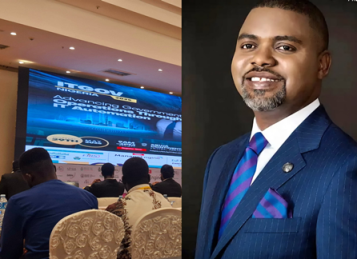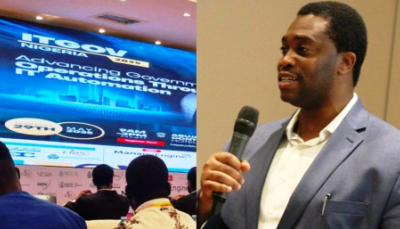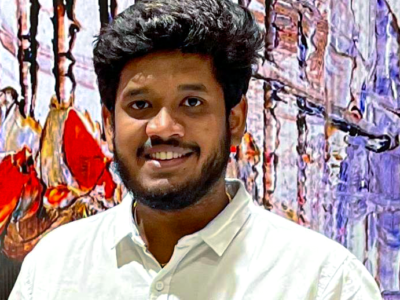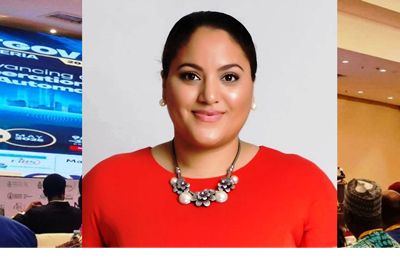Future of software companies
ExpertEdge Software and System Limited is the software arm of Computer Warehouse Group. The company implements services related to its own home-made solutions and also those of its offshore partners including Infosys of India and US based Oracle Corporation. In this interaction with eT Edge News crew of SEGUN ORUAME, MARTIN EKPEKE and MOSHOOD ABUBAKAR, Managing Director of ExpertEdge, Mr. JAMES AGADA, speaks in Lagos on why his company leads the market, how technology insurgency is altering traditional concepts and why software companies will have to refocus to reflect industry trends. AGADA argues that the term local software is a misnomer that undermines capacity of borderless solutions to have global market values particularly as insurgents such as cloud services gain foothold. Solutions win in the market not because they have national identities as Nigerian or Indian software applications but because they bring values to the market.
Some people have come to say there will be no Infosys in Nigeria without ExpertEdge. Somehow, ExpertEdge has used Infosys to redefine culture of ebanking in the country. If you put all these into perspective, would you say if you remove Infosys’ Finacle from ExpertEdge the redefinition of the banking sector you have caused wouldn’t have happened?
When we joined up with Infosys, people laughed at us and said we were late to the party. The joke was on what exactly we were thinking that we thought we were going to bring to the equation. What most people forgot was that we were coming from a banking background. We had a clear understanding of what the problem was. We knew the technology underpinnings of the existing software were not well done for the explosion that was happening in the Nigerian banking market: they were difficult to support and to extend and for many of them they were not centralised, so the banks didn’t have a full view of who were their customers. We also saw the direction of the future which was the internet and web enablement. It was remarkable that the moment the first set of banks realised and understood what we were positioning they went for it. We signed three customers in one year and nobody has done that. We ran the three projects simultaneously and they all went live before some people, who were doing core banking implementation, for the past five years at that time, could go live.
Without ExpertEdge’s local understanding of the banking industry, do you think Finacle would have been successful?
I am not a soothsayer but I don’t think so. When you have a software application like Finacle somebody has to use it and when the person is using it to run his business there will be issues of functionality that he needs to run his business which is not in the product. Don’t forget that the man who owns the product try to write it as generic as possible not specific. And nobody has of yet written software that doesn’t have a bug or an issue. Previously, what people did was that if you buy a software product then the person who sold it to you will send an army of foreign experts who will help you support it – that is how enterprise software has always been done. We said that the major value that we will provide is that we should be able to do this as much as possible, you can’t meet it 100% because you don’t own the product 100%, you have to do it as much as possible using local people who understands what the local issues are and that was an added value. We have done extension to Finacle that has extended to the Finacle core. We have helped Infosys to solve problems in Finacle outside Nigeria which even their people were struggling to solve. I think it would have been very difficult for Finacle to be successful in Nigeria if we were not willing to make the investment we made, stay behind it the way we stood behind it, definitely there would have been an ExpertEdge without Finacle.
You are implementing banking solutions and doing after sales services in Nigerian banking sector, in terms of electronic banking, how will you describe the industry and what do you think will happen in few years time?
Nigeria has become extremely sophisticated with ebanking. I am happy that I was involved in the beginning. ExpertOnline was the first product ExpertEdge first had. When we built that product, there was no internet, it was PC banking, so you put it in, and it will dial the bank. We did several activations very quickly. We wrote it first, it worked. We realised that people were becoming web based. When we came in with Finacle ebanking, the difference with what we had and Finacle ebanking was night and day. They were way ahead of us. First Atlantic Bank which later became First Inland Bank came out with the first true internet banking in Nigeria. Nobody else had anything like it before Standard Trust Bank and all of them were launching on Finacle platform. Working with First Atlantic, we also launched SMS banking and the FlashMe Cash, Infosys was surprised because they didn’t know their application could do that. We worked with them, did the customizations, the integrations to the SMS systems and it worked. When they started this SMS banking nobody has heard of M-PESA, today every bank in Nigeria is running mobile banking, ebanking, Facebook banking, and so many other channels. We are going to get a bit more sophisticated going down the line. With the advancement of the internet, technology is only always one step away, if it comes up in Turkey today, it will show up in Nigeria tomorrow. Unlike those days, we are not limited with our infrastructure or access to technology; we are only limited by our imagination. We will move to the stage where we will go from being transactional to actually being advisory that is where I see things going and I am sure we will be part of it.
What value has come from you in terms of your reach as the software arm of Computer Warehouse Group and what challenges have you foreseen beyond Nigeria as part of a transnational ICT company?
The first thing is to look at the evolution in technology whether it even makes sense for you to be a software company. The question is what is a software company? Is Google, Facebook, Apple or Oracle a software company? If you look at how these companies are evolving, does it even make sense to say you are a software company? As we are expanding across the regions, we need to ask ourselves what value we are going to bring and you start wondering, can you actually bring value as a software company? You will find that CWG is transitioning into a ‘services company,’ I am quite certain that in the next two years people will probably not recognise CWG because a lot of things would have changed in the way it does business; so too its areas of focus because the old model, as far as we are concern, is done with.
When we still talk about Nigerian local software industry, are we not going backward; is there a future for Nigerian software industry in the context of what you have just said on the altering face of the global software industry?
Unfortunately, I have the wrong views on this. I don’t like the political correctness. There is a fundamental misunderstanding of what a software industry is and it is that misunderstanding that keeps people talking about Nigerian software. At one extreme of the software industry are the algorithms, which are the basis of everything you are doing. Writing the software without knowing the algorithms is a waste of time. For example if you go to most schools you will see people doing inventory application projects and they don’t really know anything about inventory management. The other part of it is that I have the algorithm, let me now try to convert this algorithm to a usable computer programme people can use. Somebody has come up with the algorithm. Somebody must design the architecture. Somebody will have to design the various programmes. You will use and somebody will write the programme and to write the programme you will need tools, many of those tools are software, so you need compilers, software computer languages, various stacks of software from the database, and of course for you to do the database you have to come up with an algorithm. The business Oracle has built around Oracle database algorithm came out of IBM, it was Oracle that took it, built it into a working thing based on that and cut the market before IBM realised that it was a viable thing. Now you have that database, it is not running on an operating system, there are so many algorithms built into Windows, how you talk to a keyboard, monitor and so on. So somebody now writes his programme that runs on top of all these stacks and somebody starts using it, as you are using it you need to be adding things and these are all the things that make up a software industry. When you say Nigerian software what exactly do you mean? Is it that Nigerians came up with the algorithm? Is it that Nigerians designed it? Is it that Nigerians built the entire stack? For me I always find it very strange for anybody to say this is Nigerian software. I don’t know what it means. Does it mean we have a Nigerian company that built a portion of it? I don’t believe in the entire concept of saying this is a Nigerian software. People keep forgetting that in the scheme of things 70% of the expense of the IT expenditure is not buying new software or new technology, it goes to the people maintaining those software applications. When I started ExpertEdge, the idea was to build products and we built products, then we joined up with CWG, we sat down and did a strategy session, why are we wasting our time just trying to break our head with the product? Let’s sit here. Let the guy brings the product, this is where the money is being spent. This is where people need your services. Anybody can buy any software but people want to be able to say that today the interest that was calculated is the correct interest and believe me, there can be many things that will make that interest he is calculating not to be correct. Somebody needs to find out what it is and fix it. So we decided that this is where we would put in our energy; no point going to build software. We had an offer from a bank to build a banking application but we told them it is not a wise decision for us as a company, buy the one somebody has invested millions of dollars and make it work for you here and the bank has not regretted it till today.
So the whole idea of local software is a misnomer?
It is a misnomer and also dead on arrival because of cloud services nobody is waiting for you to tell them that it is Nigerian software. The whole technology is right now evolving differently. I think when we talk about Nigerian software we are missing the boat.
But ExpertEdge is a member of ISPON [Institute of Software Practitioners of Nigeria]?
Yes but this has been our view and it has never change. People thought it was because we were selling foreign software. People also don’t know that unlike many companies, we do build quite a lot of software but we have known the whole stack and we have stated it clearly: we are not going to be a product company because we didn’t think that was a sustainable business model. Today, we have something going on for microfinance banks. We have built and enhanced the software but you wouldn’t see it on the shelf to be bought because we are offering it as a service the same way you use Facebook and between now and the end of the year we are going to launch other initiatives similar to that platform.
We have done extension to Finacle that has extended to the Finacle core. We have helped to Infosys solve problems in Finacle outside Nigeria which even their people were struggling to solve. I think it would have been very difficult for Finacle to be successful in Nigeria if we were not willing to make the investment we made, stay behind it the way we stood behind it, definitely there would have been an ExpertEdge without Finacle.
[Banking] will go from being transactional to actually being advisory that is where I see things going and I am sure we will be part of it.




























